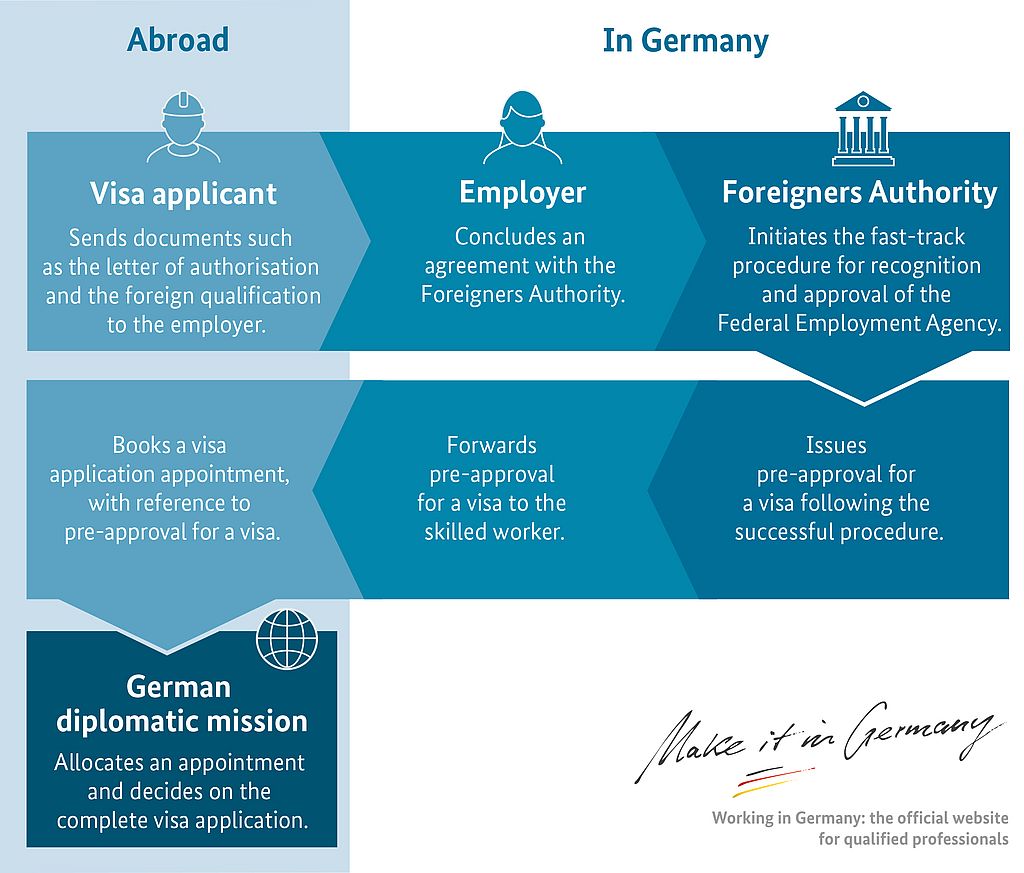
Skilled labour immigration using the fast-track procedure for skilled workers – how does it work?
Correct as of: 28/03/2022
The Skilled Immigration Act paved the way for a new mechanism to help speed up the entry of qualified professionals from abroad: the fast-track procedure for skilled workers (Section 81a of the Residence Act). In this way, employers in Germany have the option of shortening the recognition and visa procedure for their qualified professionals from abroad. Experience has been gained with the procedure since it was introduced two years ago, and it is worth reflecting on how the instrument works and how it is applied in administrative practice.
Initial situation: Why use the fast-track procedure for skilled workers?
The fast-track procedure for skilled workers under Section 81a of the Residence Act (AufenthG) is a procedural option for employers to speed up the entry of their qualified professionals from abroad thanks to fast-track procedures for the recognition of professional qualifications, approval of employment and the issuance of visas. Accelerating these procedures is a major concern for employers in the process of recruiting from abroad. In the past there have been complaints that the official procedures for the entry of qualified professionals had often taken too long. In particular, the limited resources of some German diplomatic missions abroad often led to delays in issuing visas to skilled workers from countries requiring visas[1].
Besides paving the way for the entry of qualified professionals from third countries, the fast-track procedure for skilled workers also offers German companies an entry process that meets their planning needs: the administrative procedure is significantly shortened thanks to time limits that are set out in legislation, and the employer receives support from the competent authority in Germany.
The fast-track procedure for skilled workers can be used for the following groups of people from third countries:
- Skilled workers with vocational training
- Qualified professionals with an academic degree
- Apprentices wishing to pursue in-company training in Germany
- Vocational school students, if they are able to demonstrate that employment will follow once they have completed their school-based training
- Skilled workers who enter the country for training so as to have their professional qualification recognised
- Researchers
- IT professionals who do not have a formal qualification but have professional experience and expertise
Following the fast-track procedure: How does it work?
An employer can initiate the fast-track procedure with the Foreigners Authority in Germany by presenting a specific employment contract and a letter of authorisation from the qualified professional from abroad (see Figure 1). Either a central agency has been established to deal with the fast-track procedure for skilled workers or this may fall into the responsibility of the relevant local Foreigners Authority, depending on the federal state. To find out which authorities are responsible for implementing the procedure in each federal state, please refer to the “Make it in Germany” website .

Figure 1: The ideal-typical course of action for of the fast-track procedure for skilled workers
Employers should therefore contact the competent Foreigners Authority for the procedure in the relevant federal state. The Foreigners Authority acts as an intermediary between the parties to the procedure (employer, recognition body, labour authorities, German diplomatic mission), and is responsible for providing comprehensive advice to the employer. In practice, many competent authorities cooperate with existing well-established regional structures such as the “Integration through Qualification” network on matters concerning recognition, or with the regional Welcome Centres. As Figure 1 shows, the following steps are important when following the fast-track procedure for skilled workers:
- Conclusion of an agreement: The Foreigners Authority and the employer enter into an agreement covering the obligations of the employer, the skilled worker and all other parties involved in the procedure. In addition, the employer is given a description of the procedures, specifying the parties involved, the supporting documents to be provided and the time limits.
- Recognition procedure: Once the agreement has been concluded with the employer, the Foreigners Authority initiates the procedure for recognising or assessing the equivalence of foreign qualifications by contacting the competent recognition body. Once the application documents have been submitted in full, the recognition body usually has up to two months to decide on the recognition of professional qualifications.
- Approval of employment: Regardless of the outcome of the recognition procedure, the Foreigners Authority submits an application to the Federal Employment Agency for approval of the intended employment in Germany. Approval of employment may be requested if the qualified professional receives full or partial recognition of their qualification. If the Federal Employment Agency has no follow-up questions or requests within the space of a week, approval is deemed to have been granted.
- Pre-approval for a visa: If all requirements (including approval by the Federal Employment Agency and recognition of foreign qualifications, where applicable, and confirmation of a licence to practise a profession, where applicable) are met, the employer receives a pre-approval for a visa. This document is then forwarded to the qualified professional abroad. In addition, the Foreigners Authority stores a digital copy of the pre-approval for a visa in the Central Register of Foreign Nationals (AZR), meaning that it can be accessed by the competent German diplomatic mission.
- Visa procedure abroad: After receiving the pre-approval, the qualified professional from abroad books an appointment to apply for a visa at the German diplomatic mission within three weeks. At this appointment, the skilled worker is required to present the original pre-approval document together with any other documents required to apply for a visa. Once the complete visa application has been submitted by the qualified professional, the diplomatic mission will usually decide on the visa within three further weeks.
Allowing for the various stages of the procedure and the associated fixed time limits, the fast-track procedure for skilled workers may take about four months in total.
Tips for employers on fast-track recruitment abroad
Employers considering applying for the fast-track procedure for skilled workers to speed up the entry of newly recruited employees from third countries must play an active role throughout the process. The first step involves attending an advisory meeting with the competent Foreigners Authority. To ensure they are well prepared for the meeting, employers may wish to consider the following aspects.
- Preliminary information on the recognition procedure: To take up skilled employment in Germany, skilled workers from third countries need a professional qualification that enables them to practise the desired profession in Germany. If the professional holds a foreign qualification, it has to be checked whether the qualification needs to be recognised or assessed for equivalence in Germany. Information on the recognition procedure is available on websites such as the Recognition in Germany portal .
- Preliminary information on visa regulations: Whether a qualified professional needs a visa to enter Germany depends on their nationality. To ensure that the qualified professional is allowed to be employed immediately after entering the country, they must apply for the correct visa abroad. Employers can find out about the different types of visa for qualified professionals and apprentices on the “Make it in Germany” portal.
- Compilation of papers and documents: Numerous documents are required to follow the fast-track procedure for skilled workers. To start with, the employer needs a letter of authorisation from the qualified professional from abroad, as well as details about the professional’s identity and qualifications. Employers should request the necessary documents from their future qualified professional in advance, or compile them. The “Make it in Germany” website contains all the necessary forms for the procedure, including a model agreement and a template for a letter of authorisation to apply for the fast-track procedure for skilled workers.
- Payment of fees: There are costs and fees to be paid throughout the immigration process. Most of the costs involved, e.g. for the recognition procedure (between €100 and €600, depending on the profession) and the visa procedure (€75 in local currency), are paid for by the qualified professional from abroad. In addition, there is a €411 fee for applying for the fast-track procedure. According to the law, the qualified professional is regarded as the person liable to pay the fee. However, since employers also have a vested interest in speeding up the entry of skilled workers, they can support their future employees by offering to cover the costs.
More information on the portal
- Quick-Check for employers
- Section on the fast-track procedure for skilled workers
- A guide to the fast-track procedure for skilled workers
- Supporting documents for applying for a fast-track procedure for skilled workers
[1] Federal Statistical Office of Germany (2018): Einfacher beschäftigen – Beschäftigung ausländischer Fachkräfte / Optimierung der Einreise zur Arbeitsaufnahme (Simplifying employment – employment of skilled workers from abroad / optimising entry for employment): https://www.destatis.de/DE/Themen/Staat/Buerokratiekosten/Publikationen/Downloads-Buerokratiekosten/einfacher-beschaeftigen.pdf?__blob=publicationFile (External link)
Do you have any questions?
Let us advise you on your opportunities to work and live in Germany. Our experts will support you with questions regarding job search, visa, recognition and learning German.
You can find out more about the various contact options by clicking on one of the icons in the bar below.
